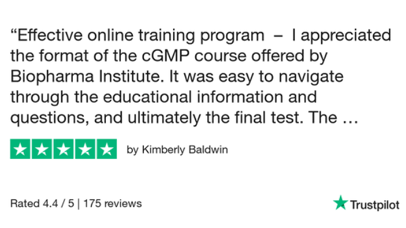GLP: Sampling Plans (Pharmaceuticals)
 |
Price: $ |
Document your dedication to quality, compliance, safety, and job performance by earning a certification of training.Training Program: GLP: Sampling Plans (Pharmaceuticals)Training Provided By: Biopharma Institute Website: https://www.biopharmainstitute.com Schedule: Self-paced. Immediate access to training materials upon enrollment. Description:  Sampling plans are strategic approaches used in quality control and statistical analysis to select a representative subset of a population, or batch, for testing or inspection. The objective is to make inferences about the entire population based on the characteristics and quality of the sampled subset, thereby minimizing the time and cost associated with inspecting every item. Sampling plans are widely used in manufacturing, research, auditing, and various fields where analyzing the entire population would be impractical or unnecessary. There are several types of sampling plans, each suited to different scenarios and objectives: Simple Random Sampling: Every member of the population has an equal chance of being selected. This method is straightforward but may not always be the most efficient, especially in heterogeneous populations. Stratified Sampling: The population is divided into homogeneous subgroups, or strata, based on specific characteristics, and samples are drawn from each stratum. This ensures representation across key segments of the population. Cluster Sampling: The population is divided into clusters, and entire clusters are randomly selected for sampling. This method is useful when the population is geographically spread out. Systematic Sampling: A starting point is chosen at random, and subsequent samples are selected at regular intervals from the ordering of the population. This method is simpler to implement than simple random sampling but can introduce bias if there is an underlying pattern in the population. Acceptance Sampling: Widely used in quality control, this approach involves testing a random sample from a batch and deciding whether to accept or reject the entire batch based on the number of defects found. Acceptance sampling plans can be single, double, or multiple depending on how many rounds of sampling are conducted. Sequential Sampling: Similar to acceptance sampling, but the decision to accept, reject, or continue sampling is made at each step as samples are tested one after another. This approach can be more efficient but requires more complex decision rules. Sampling plans often involve statistical concepts such as confidence intervals, hypothesis testing, and acceptable quality levels (AQLs). The choice of a sampling plan depends on factors such as the importance of the decision being made based on the sample, the cost of sampling, the nature of the population, and the acceptable risk levels for making incorrect inferences. In quality control, particularly, acceptance sampling plans are governed by standards such as ISO 2859 for attribute sampling (based on the presence or absence of defects) and ISO 3951 for variable sampling (based on measurable characteristics). These standards help organizations decide on the sample size and acceptance criteria to balance the risks of accepting defective products (consumer risk) and rejecting good products (producer risk). This online training program discusses the unique problems found in pharmaceutical production, whether inactive or active chemical materials, unprinted or printed packaging materials, process water, in-process materials, or finished product. Additionally, there is a review of the application and theory of practical and statistical sampling plans. The course covers an introduction to sampling plans, reading attribute sampling plans, cGMP requirements for chemicals, cGMP requirements for printed matter, sampling techniques and pooling, targeted sampling plans, and a summary of all previously listed topics at the end. Certification Requirements: Students must view the entire course and successfully pass an online, multiple-choice final assessment within a 12-month period. A certificate of completion is immediately accessible in PDF format after satisfying the requirements. Biopharma Institute's online training courses include immediate access after enrollment. Username, password, and instructions are emailed to the student directly following online enrollment into the program. Course takers may attempt the final assessment any number of times, as needed, to achieve a passing score. The certificate of completion is promptly launched and made available to the student upon course completion. Certificates are issued in an encrypted PDF format, and include a watermark, unique validation code, and QR verification barcode. Once all training requirements have been satisfied the achievement can be verified from our website using the unique certificate ID or QR barcode located on the certificate. For professional certification programs, a digital badge is additionally issued to verify training and document the achievement. Digital badges can be displayed on social networking sites, such as LinkedIn, Facebook, Twitter, and Badgr. Biopharma Institute certificates and digital badges include the date of completion, but do not have an expiration date. However, compliance training is typically considered valid for a period of 3 years. Many organizations suggest that compliance training should be refreshed at least every three years to stay up to date with regulations, standards, guidelines, and to reinforce the importance of maintaining compliance. The validity period for employee compliance training would be determined by those responsible for managing quality assurance. |
Outline:INTRODUCTION TO SAMPLING PLANS Introduction Purpose of sampling Sampling requirements Sampling steps Sampling plans Review READING ATTRIBUTE SAMPLING PLANS Introduction Defining an attribute AQL I AQL II Parameters I Parameters II Parameters III Reading plans I Reading plans II Reading plans III Try some sampling plans Review CGMP REQUIREMENTS FOR CHEMICALS Introduction Chemicals requirements Supplier qualification Chemical testing plans Microbial testing plans Review CGMP REQUIREMENTS FOR PRINTED MATTER Printed matter requirements Review SAMPLING TECHNIQUES AND POOLING Introduction Content uniformity Liquids sampling issues Pooling/compositing rules Sampling frequency Zero Acceptance Number Review TARGETED SAMPLING PLANS Introduction Limitations Targeted sampling Water samples Sampling points Review CONCLUSION Summary | Objectives:- Describe the considerations for setting up sampling plans. - Read and interpret an attribute sampling plan. - List special cGMP requirements for sampling chemicals. - List special cGMP requirements for sampling printed matter and components. - State the cGMP expectations for sample protection and pooling. - Set up targeted sampling plans for a purified/water for injection (WFI) water system. | |
Use our Search Form to Find What You're Looking For:
Benefits of Training with Biopharma Institute
| Immediate access to courses: | Username, password, instructions, and receipt of payment are immediately emailed upon online enrollment. |
| Self-paced, asynchronous eLearning: | 24/7 access to all course materials and assessments for 12 months. |
| Open enrollment: | No prior course prerequisites or work experience required. |
| Expertise: | Courses developed by subject matter experts (SMEs) in the area being taught. |
| Current and validated: | Training is current with respect to regulations, procedures, and 3rd party validated and/or accredited. |
| Optimized for learning: | Courses include voiceovers, easy navigation, reading materials, case studies, progress checks, and high-quality animations to increase retention of subject matter. |
| Secure and safe access: | Encrypted website and LMS connections, firewall, and daily malware scans deliver optimal security and performance. |
| Flexible final assessments: | Multiple-choice questions can be taken repeatedly until a passing score is achieved. |
| Direct access to certificates: | Upon completion, certificates are immediately issued in an encrypted PDF format. Certificates include a watermark, unique validation code, and QR verification barcode. |
| Verification of training: | Certificates are verifiable online using QR barcode or the unique ID code. Digital badges are additionally issued for all professional certification programs. |
| Training manager access: | A proprietary portal offers access to download enrollment reports, training records, account balance, and more. |
| SCORM-compliant courses: | Courses can be delivered directly to most corporate Learning Management Systems (LMS). |
| Purchase orders (POs): | POs are accepted from all companies. Request an invoice when starting the procurement process. |
| Reimbursement: | Some employers may reimburse their employees for training expenses. Check your company's policy. |
| Financial assistance: | Payment plans are available to those who qualify. Alternatively, purchasing individual courses one at a time is also an option. |
| Career advancement: | Professional certifications help demonstrate interest and dedication to career and job performance. They may be helpful for those seeking to grow their career or transitioning to a different position within an organization. Professional certifications are a great addition to a resume, offer talking points for the interview, and practical knowledge for performing duties. |
Have Questions? Contact Us:
Use the form below if you would like more information on our programs. You may want to request a quote on group training or an invoice for generating a company purchase order. For quotes or invoices please provide the course(s) and number of students. Alternatively, call toll-free from the US or Canada: +1 (888) 424-6576. International callers may dial: +1 (201) 301-8370.

 Download
Download 




